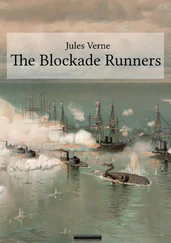Canvas hose let in the air necessary to make the stoves draw; other hose served for escape-pipes for the steam. Two condensers were fixed in the two rooms; they gathered the vapour instead of letting it escape, and were emptied twice a week; sometimes they contained several bushels of ice. By means of the air-pipes the fires could be easily regulated, and it was found that very little fuel was necessary to keep up a temperature of 50 degrees in the rooms. But Hatteras saw with grief that he had only enough coal left for two months’ firing. A drying-room was prepared for the garments that were obliged to be washed, as they could not be hung in the air or they would have been frozen and spoiled. The delicate parts of the machine were taken to pieces carefully, and the room where they were placed was closed up hermetically. The rules for life on board were drawn up by Hatteras and hung up in the common room. The men got up at six in the morning, and their hammocks were exposed to the air three times a week; the floors of the two rooms were rubbed with warm sand every morning; boiling tea was served out at every meal, and the food varied as much as possible, according to the different days of the week; it consisted of bread, flour, beef suet and raisins for puddings, sugar, cocoa, tea, rice, lemon-juice, preserved meat, salted beef and pork, pickled cabbage and other vegetables; the kitchen was outside the common rooms, and the men were thus deprived of its heat, but cooking is a constant source of evaporation and humidity.
The health of men depends a great deal on the food they eat; under these high latitudes it is of great importance to consume as much animal food as possible. The doctor presided at the drawing up of the bill of fare.
“We must take example from the Esquimaux,” said he; “they have received their lessons from nature, and are our teachers here; although Arabians and Africans can live on a few dates and a handful of rice, it is very different here, where we must eat a great deal and often. The Esquimaux absorb as much as ten and fifteen pounds of oil in a day. If you do not like oil, you must have recourse to things rich in sugar and fat. In a word, you want carbon in the stove inside you as much as the stove there wants coal.”
Every man was forced to take a bath in the half-frozen water condensed from the fire. The doctor set the example; he did it at first as we do all disagreeable things that we feel obliged to do, but he soon began to take extreme pleasure in it. When the men had to go out either to hunt or work they had to take great care not to get frostbitten; and if by accident it happened, they made haste to rub the part attacked with snow to bring back the circulation of the blood. Besides being carefully clothed in wool from head to foot, the men wore hoods of buckskin and sealskin trousers, through which it is impossible for the wind to penetrate. All these preparations took about three weeks, and the 10th of October came round without anything remarkable happening.
Table of Contents
That day the thermometer went down to 3 degrees below zero. The weather was pretty calm, and the cold without breeze was bearable. Hatteras profited by the clearness of the atmosphere to reconnoitre the surrounding plains; he climbed one of the highest icebergs to the north, and could see nothing, as far as his telescope would let him, but icefields and icebergs. No land anywhere, but the image of chaos in its saddest aspect. He came back on board trying to calculate the probable duration of his captivity. The hunters, and amongst them the doctor, James Wall, Simpson, Johnson, and Bell, did not fail to supply the ship with fresh meat. Birds had disappeared; they were gone to less rigorous southern climates. The ptarmigans, a sort of partridge, alone stay the winter in these latitudes; they are easily killed, and their great number promised an abundant supply of game. There were plenty of hares, foxes, wolves, ermine, and bears; there were enough for any sportsman, English, French, or Norwegian; but they were difficult to get at, and difficult to distinguish on the white plains from the whiteness of their fur; when the intense cold comes their fur changes colour, and white is their winter colour. The doctor found that this change of fur is not caused by the change of temperature, for it takes place in the month of October, and is simply a precaution of Providence to guard them from the rigour of a boreal winter.
Seals were abundant in all their varieties, and were particularly sought after by the hunters for the sake, not only of their skins, but their fat, which is very warming; besides which, the liver of these animals makes excellent fuel: hundreds of them were to be seen, and two or three miles to the north of the brig the ice was literally perforated all over with the holes these enormous amphibians make; only they smelt the hunters from afar, and many were wounded that escaped by plunging under the ice. However, on the 19th, Simpson managed to catch one at about a hundred yards from the ship; he had taken the precaution to block up its hole of refuge so that it was at the mercy of the hunters. It took several bullets to kill the animal, which measured nine feet in length; its bulldog head, the sixteen teeth in its jaws, its large pectoral fins in the shape of pinions, and its little tail, furnished with another pair of fins, made it a good specimen of the family of dog-hound fish. The doctor, wishing to preserve the head for his natural history collection, and its skin for his future use, had them prepared by a rapid and inexpensive process. He plunged the body of the animal into the hole in the ice, and thousands of little prawns soon ate off all the flesh; in half a day the work was accomplished, and the most skilful of the honourable corporation of Liverpool tanners could not have succeeded better.
As soon as the sun had passed the autumnal equinox—that is to say, on the 23rd of September—winter may be said to begin in the Arctic regions. The sun disappears entirely on the 23rd of October, lighting up with its oblique rays the summits of the frozen mountains. The doctor wished him a traveller’s farewell; he was not going to see him again till February. But obscurity is not complete during this long absence of the sun; the moon comes each month to take its place as well as she can; starlight is very bright, and there is besides frequent aurora borealis, and a refraction peculiar to the snowy horizons; besides, the sun at the very moment of his greatest austral declination, the 21st of December, is still only 13 degrees from the Polar horizon, so that there is twilight for a few hours; only fogs, mists, and snowstorms often plunge these regions into complete obscurity. However, at this epoch the weather was pretty favourable; the partridges and the hares were the only animals that had a right to complain, for the sportsmen did not give them a moment’s peace; they set several fox-traps, but the suspicious animals did not let themselves be caught so easily; they would often come and eat the snare by scratching out the snow from under the trap; the doctor wished them at the devil, as he could not get them himself. On the 25th of October the thermometer marked more than 4 degrees below zero. A violent tempest set in; the air was thick with snow, which prevented a ray of light reaching the Forward . During several hours they were very uneasy about Bell and Simpson, who had gone too far whilst hunting; they did not reach the ship till the next day, after having lain for a whole day in their buckskins, whilst the tempest swept the air about them, and buried them under five feet of snow. They were nearly frozen, and the doctor had some trouble to restore their circulation.
The tempest lasted a week without interruption. It was impossible to stir out. In a single day the temperature varied fifteen and twenty degrees. During their forced idleness each one lived to himself; some slept, others smoked, or talked in whispers, stopping when they saw the doctor or Johnson approach; there was no moral union between the men; they only met for evening prayers, and on Sunday for Divine service. Clifton had counted that once the 78th parallel cleared, his share in the bounty would amount to 375 pounds; he thought that enough, and his ambition did not go beyond. The others were of the same opinion, and only thought of enjoying the fortune acquired at such a price. Hatteras was hardly ever seen. He neither took part in the hunting nor other excursions. He felt no interest in the meteorological phenomena which excited the doctor’s admiration. He lived for one idea; it was comprehended in three words—the North Pole. He was constantly looking forward to the moment when the Forward , once more free, would begin her adventurous voyage again.
Читать дальше












